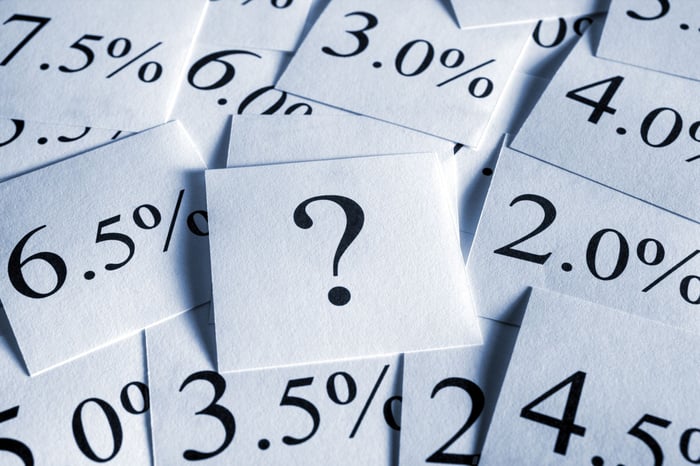This Vanguard Dividend Appreciation ETF Is Better for Growth Than Dividends
-
The Vanguard Dividend Appreciation ETF is designed to track stocks that have increased their dividend regularly.
-
The ETF has a dividend yield of 1.7%, which is only slightly better than the 1.2% yield of the S&P 500 index.
-
Investors looking at the Vanguard Dividend Appreciation ETF need to understand that dividend yield isn't a focus for this ETF.
The word "dividend" is in the Vanguard Dividend Appreciation ETF's (VIG -1.42%) name. That might lead some investors to believe that dividends are an important factor for the exchange-traded fund (ETF). And they are, but not in a way that most income investors will appreciate.
Before you buy the Vanguard Dividend Appreciation ETF you need to understand how it uses dividends to build its portfolio.
What does the Vanguard Dividend Appreciation ETF do?
The Vanguard Dividend Appreciation ETF tracks an index. So, from a big-picture perspective, it simply owns whatever is in the index. So if you want to understand what you are buying here you need to look at the index, which is the S&P U.S. Dividend Growers Index.

Image source: Getty Images.
You can already get a clue from that index name about what it is looking for: dividend growers. But even high-yield stocks can grow their dividends. For example, Altria has increased its dividend annually for over a decade and it has a lofty 8.1% dividend yield. You won't find it among the 338 stocks that made it into the Vanguard Dividend Appreciation ETF. That would seem like a glaring oversight. It isn't.
The S&P U.S. Dividend Growers Index is designed to measure the performance of U.S. companies that have followed a policy of consistently increasing dividends every year for at least 10 consecutive years. The index excludes the top 25% highest-yielding eligible companies from the index.
The quote above is from S&P Global's product description of the index followed by the Vanguard Dividend Appreciation ETF. To highlight the most notable part: The highest-yielding stocks that pass the 10-year dividend increase screen are specifically removed from consideration. That helps explain why the Vanguard Dividend Appreciation ETF's dividend yield is only 1.7%. Sure, that's higher than the S&P 500 index's (^GSPC -1.86%) 1.2%, but if you are looking for dividend income, this exchange-traded fund probably won't be a good fit for you even though it has the word "dividend" in its name.
What is the Vanguard Dividend Appreciation ETF really doing?
To put it bluntly, the Vanguard Dividend Appreciation ETF is using dividends as a screening tool. That's happening in two important ways.

VIG data by YCharts
First, focusing on a company's annual streak of dividend increases is a way to find financially strong companies that are growing over time. That makes complete sense; a company that is struggling probably won't be able to increase its dividend year in and year out. So using dividends in this manner is a solid starting point. However, things can change and sometimes companies that have strong business histories fall on hard times.
That brings up the second use of dividends, only this time it's the dividend yield. Wall Street is forward-looking, and if it believes a company is struggling it will push the price lower. That, in turn, will push the yield higher. In this way, yield acts as a rough gauge of investor sentiment. But it also acts as a warning signal, with high yields often highlighting struggling companies that might end up cutting their dividends. Altria, for example, has been suffering through a long decline in the volume of cigarettes it sells. That's why the yield is so high.
Thus, by excluding the 25% of dividend-growing stocks with the highest yields, the Vanguard Dividend Appreciation ETF is attempting to remove companies that may be yield traps. Or, perhaps a better way to put it, the business risk of a high-yield stock may be too high to justify owning it. All in, the methodology is simple but elegant. However, it isn't an ETF that investors trying to live off of the income their portfolios generate will likely find particularly attractive.
The Vanguard Dividend Appreciation ETF is a growth fund
Investors looking at the Vanguard Dividend Appreciation ETF need to understand why it has the word "dividend" in its name. Using dividends as a screening tool is the key. Trying to generate income really isn't.
While there is a place for this ETF in a lot of portfolios, you'll want to consider it very carefully before you buy it. If you are a growth-focused investor or a growth-and-income investor, it might be just right. If you are an income-focused investor, it probably won't be a good choice for you.
免责声明:投资有风险,本文并非投资建议,以上内容不应被视为任何金融产品的购买或出售要约、建议或邀请,作者或其他用户的任何相关讨论、评论或帖子也不应被视为此类内容。本文仅供一般参考,不考虑您的个人投资目标、财务状况或需求。TTM对信息的准确性和完整性不承担任何责任或保证,投资者应自行研究并在投资前寻求专业建议。
热议股票
- 1
- 2
- 3
- 4
- 5
- 6
- 7
- 8
- 9
- 10